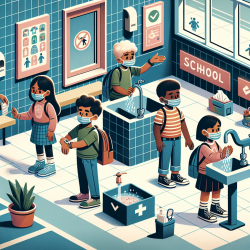Introduction
In the wake of the COVID-19 pandemic, the importance of nonpharmaceutical interventions (NPIs) in mitigating the spread of viral respiratory infections has been underscored. A recent umbrella review, "Nonpharmaceutical interventions to prevent viral respiratory infection in community settings," provides valuable insights into the effectiveness of various NPIs. This blog explores how practitioners, particularly those in educational settings, can implement these findings to enhance their skills and improve student safety.
Understanding the Research
The umbrella review synthesized data from 24 studies, including systematic reviews and meta-analyses, to evaluate the effectiveness of NPIs in community settings. The review highlighted that hand hygiene and facemask use are among the most effective interventions for preventing respiratory viral transmission. However, the evidence for other interventions, such as school closures and nasal saline rinses, was found to be sparse and of low quality.
Key Findings for Practitioners
For practitioners working in schools, the review offers several actionable insights:
- Hand Hygiene: Consistent hand hygiene practices, including the use of soap and sanitizers, are strongly supported by evidence as a means to reduce the transmission of respiratory viruses. Schools should ensure that handwashing facilities are readily available and that students are educated on proper handwashing techniques.
- Facemasks: While the evidence on facemasks is somewhat inconsistent, their use is generally supported, especially in settings where social distancing is challenging. Schools can consider implementing mask mandates during periods of high transmission.
- Comprehensive Strategies: Combining hand hygiene with facemask use may offer additional protection, although the evidence for this combination is not as robust. Nonetheless, a layered approach that includes multiple NPIs is advisable.
Encouraging Further Research
While the review provides a solid foundation, there is a need for further research to address gaps in the evidence, particularly regarding the effectiveness of less-studied interventions like nasal rinses and school closures. Practitioners are encouraged to stay informed about ongoing research and to contribute to data collection efforts where possible.
Conclusion
The umbrella review underscores the importance of hand hygiene and facemasks as primary NPIs in community settings, including schools. By implementing these interventions, practitioners can play a crucial role in reducing the spread of respiratory viruses and safeguarding the health of students and staff.
To read the original research paper, please follow this link: Nonpharmaceutical interventions to prevent viral respiratory infection in community settings: an umbrella review.










